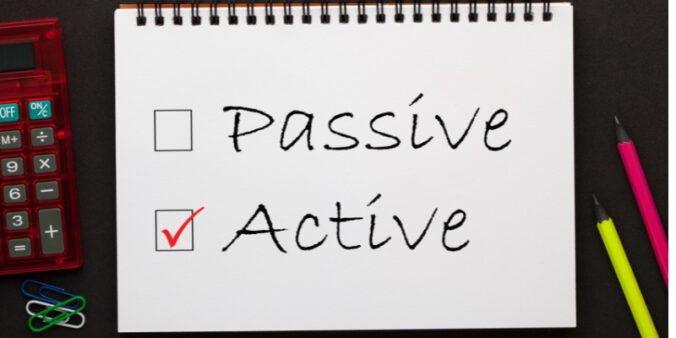Hier soll einmal eine Lanze gebrochen werden für das Passiv im Englischen.
In vielen Grammatikbüchern und Websites zum Thema gilt das Passiv als etwas Hochunanständiges, was unbedingt vermieden werden sollte.
Nun ist es so, dass das Englische (anders als das Deutsche) über die Verlaufsform verfügt, die oft als sinnvolle Alternative zum Passiv eingesetzt werden kann (ein Beitrag zur Verlaufsform findet sich hier). Zur Erinnerung: englische Verlaufsformen werden am Besten über eine Passivform ins Deutsche übersetzt, wobei Objekt (etwas, das Gegenstand einer Handlung ist) und idealerweise auch Subjekt (Handelnder) genannt werden.
Ich bekomme regelmäßig Zustände, wenn der Kontoauszugsdrucker meiner Bank verkündet: “Drucke Blatt 2 von 7” (dem liegt mit Sicherheit eine ursprünglich englische Formulierung “Printing sheet 2 of 7” zugrunde). Wenn “Drucke” als Anthropomorphisierung (die Maschine spricht mit mir) gemeint ist, dann sollte es wenigstens “Ich drucke…” heißen. Nein, richtig wäre hier “Blatt 2 von 7 wird gedruckt”. Und nichts anderes.
Es gibt seriöse Quellen, die Fälle auflisten, in denen der Einsatz des Passivs durchaus geboten sein kann.
In some sentences, passive voice can be perfectly acceptable. You might use it in the following cases:
https://advice.writing.utoronto.ca/revising/passive-voice/
- The actor is unknown:
The cave paintings of Lascaux were made in the Upper Old Stone Age. [We don’t know who made them.]- The actor is irrelevant:
An experimental solar power plant will be built in the Australian desert. [We are not interested in who is building it.]- You want to be vague about who is responsible:
Mistakes were made. [Common in bureaucratic writing!]- You are talking about a general truth:
Rules are made to be broken. [By whomever, whenever.]- You want to emphasize the person or thing acted on. For example, it may be your main topic:
Insulin was first discovered in 1921 by researchers at the University of Toronto. It is still the only treatment available for diabetes.- You are writing in a scientific genre that traditionally relies on passive voice. Passive voice is often preferred in lab reports and scientific research papers, most notably in the Materials and Methods section:
The sodium hydroxide was dissolved in water. This solution was then titrated with hydrochloric acid.
Andererseits gibt es Fälle, in denen aktive Formulierungen möglich sind und präziser und eleganter erscheinen. Die folgenden Beispiele sind dem Writing Style Guide des amerikanischen Department of Defense (DoD) entnommen (eine Quelle, die ich schon mehrmals empfohlen habe).
| Passive Voice | Active Voice |
| Frequently omits the doer of the action. An information copy of the board meeting minutes must be forwarded to the members. A military chaplain of a particular religious organization may be appointed as a consultant. | Identifies the doer. The Chair must forward an information copy of the board meeting minutes to the members. The Board may appoint a military chaplain of a particular religious organization as a consultant. |
| Frequently is longer and less direct; frequently includes a “by” phrase. A written agreement will be executed by the parties. Implementing instructions will be issued by the DoD Components. | Gets to the point. The parties execute a written agreement. The DoD Components issue implementing instructions. |
Die Beispiele zeigen, dass die Aktivformulierung den Vorteil hat, den Handelnden zu benennen, während er in der Passivform vage bleibt.
Meine Empfehlung wäre daher:
- Aktive Voice verwenden, wo immer möglich und sinnvoll
- Passive Voice schreiben in Fällen, in denen es richtig ist (siehe die Beispiele oben von der University of Toronto)
- Das Passiv vermeiden, wenn sich eine Formulierung in der Verlaufsform anbietet
- Eine Formulierung mit Verlaufsform im Englischen in eine Passivformulierung im Deutschen übersetzen (“Installing…” — “Windows/Update wird installiert”).

Schreiben Sie einen Kommentar